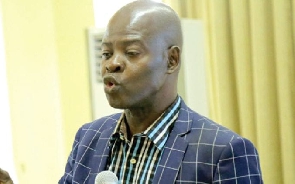The state’s 10 percent carried interest in mining operations has yielded insignificant returns over the years, the Ghana Extractive Industries Transparency Initiative (GHEITI) has said – proposing that the share be converted into mineral resources rather than dividends.
Under the current mining arrangements mineral rights are granted to private parties, giving them the right to mine minerals in the ground with government entitled, usually, to a 10 percent equity interest in the mineral operations even if it does not make a financial contribution. This share is mostly received as dividends, and when a company does not make profit the state gets nothing for that particular year.
This practice, GHEITI reiterated, has unfortunately not benefitted the state because even when some of the companies make profit, they can decide to channel funds into different expansion projects and other initiatives; thereby denying the state of much-needed revenue for development.
To correct this loophole under the current system, GHEITI – a global standard for improving transparency and accountability in the oil, gas and mining sectors, wants government’s share or interest in mining contracts to be converted into minerals; ideally, to support the Bank of Ghana gold reserve drive and the Gold for Oil barter scheme.
Co-chair of the Ghana Extractive Industry Transparency Initiative, Dr. Steve Manteaw, stressed that it is important for government to devise innovative ways to avoid being shortchanged by these firms – emphasising that one of the ways to ensure this is to reconsider the carried interest aspect.
“The mining companies are here to make a profit and repatriate the same, and not to work for government. So, if government is not able to find innovative ways of benefitting from its own resources, these firms will not play benevolence with the nation. Our carried interest in this space must be reconsidered and converted or we will continue to miss out,” he said.
GHEITI is of the strong conviction that if the carried interest is converted to a share of minerals production, the state stands a better chance to reap significant benefits from this instrument.
More importantly, he said, the proposal if considered will contribute to optimising the country’s mineral resources – particularly the Bank of Ghana’s Gold Purchase programme launched in June 2021.
Similarly, the Gold for Oil programme was introduced as a government initiative under which the state, through Bulk Oil Storage and Transportation Company (BOST), is importing petroleum products and paying with gold instead of foreign exchange. It was rolled out in response to the recent depreciation in value of the cedi against major international trading currencies and government’s inability to raise loans on the international markets, leading to a sharp fall in the country’s foreign exchange reserve.
According to Dr Manteaw, the core of these two critical policies relies largely on the country’s ability to create enough gold reserves. In this vein, it is prudent for government to look at how to own the gold without having to pay so much to buy from the producers.
Dr. Bawumia’s take
Vice President Dr. Mahamudu Bawumia, in May 2018 at the IMF’s Regional Economic Outlook for sub-Saharan Africa launch in Accra, lamented that government’s 10 percent ‘carried interest’ in mining operations is “virtually useless” and has yielded zero dividends to government for years, depriving the people of Ghana of considerable domestic revenue amounts.
Citing the issue of Ghana’s ‘carried interest’ in the mining sector, the Vice President stated that: “If you look at the existing natural resource regime, Ghana in the mining sector for example has a carried interest of about 10 percent; and out of this carried interest the expectation is that Ghana will receive dividends.
“When we look at the data, however, we see a matrix of zeros as far as the dividends that Ghana has earned from this carried interest. From 2012 it is largely populated by a matrix of zeros, so it means to a large extent that the carried interest in mining is virtually useless as far as Ghana is concerned – because we are earning zero from it.”
He further advocated a need to re-look at the whole regime around that arrangement; adding that what’s needed is a regional strategy for mineral resource development – from gold to bauxite to manganese and iron – in order to move up the global value chain for each of these minerals.
Business News of Saturday, 19 August 2023
Source: thebftonline.com













